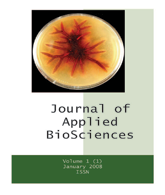Journal of Applied Biosciences (J. Appl. Biosci.) [ISSN 1997 - 5902]
Volume 57: 4173 - 4181. Published September, 2012.
Department of
Plant Science and Crop Protection, Faculty of Agriculture, University of
Nairobi, P.O. Box 29053, Nairobi, Kenya
1Corresponding
author Email: [email protected]
RESUME
Objective: This paper reports
on a study conducted to determine the effectiveness of pea rhizobia (Rhizobium
leguminosarum bv. viciae) resident in Central
Kenyan soils.
Methodology
and results:
Garden pea (Pisum sativum cv.
Plum) grown in pots containing soils
collected from 26 sites, with and without a history of pea cultivation, in central
Kenya was inoculated with a commercial rhizobial strain, supplied with 74 mg N
pot-1, or did not receive any treatment (control). Rhizobial
inoculation enhanced pea nodule numbers in soils from some sites that had no
history of pea cultivation. Nitrogen fertilizer depressed pea nodulation in soil
samples from all sites. Most abundant active and total nodules (20 and 22
nodules plant -1) were recorded in sites with adequate soil N, high
organic carbon and history of pea cultivation In many cases, plants in
untreated soils had a high nodule number and accumulated more shoot biomass
than plants growing in inoculated or nitrogen supplied soil. This confirmed the
N2 fixation efficiency of indigenous pea rhizobia strains. Plants
that had poor nodule formation were those growing in soils from a site in Nyeri
that was low in soil N and organic carbon. .
Conclusion
and application:
Most soils in Central Kenya have abundant and efficient native strains of pea rhizobia irrespective of pea
cultivation history. In some sites, indigenous rhizobia out-performed the
commercial inoculant strain. Thus, it is advisable to screen indigenous pea
rhizobia strains in the target sites for N2 fixation efficiency with
the objective of making more effective inoculants. Improvement in soil organic
carbon in Central Kenya can enhance the benefits accruable from pea N2
fixation. A similar study involving a broad range of pea genotypes and strains
of Rhizobium leguminosarum bv. viciae is recommended.
FULL PAPER [PDF AVAILABLE HERE]
